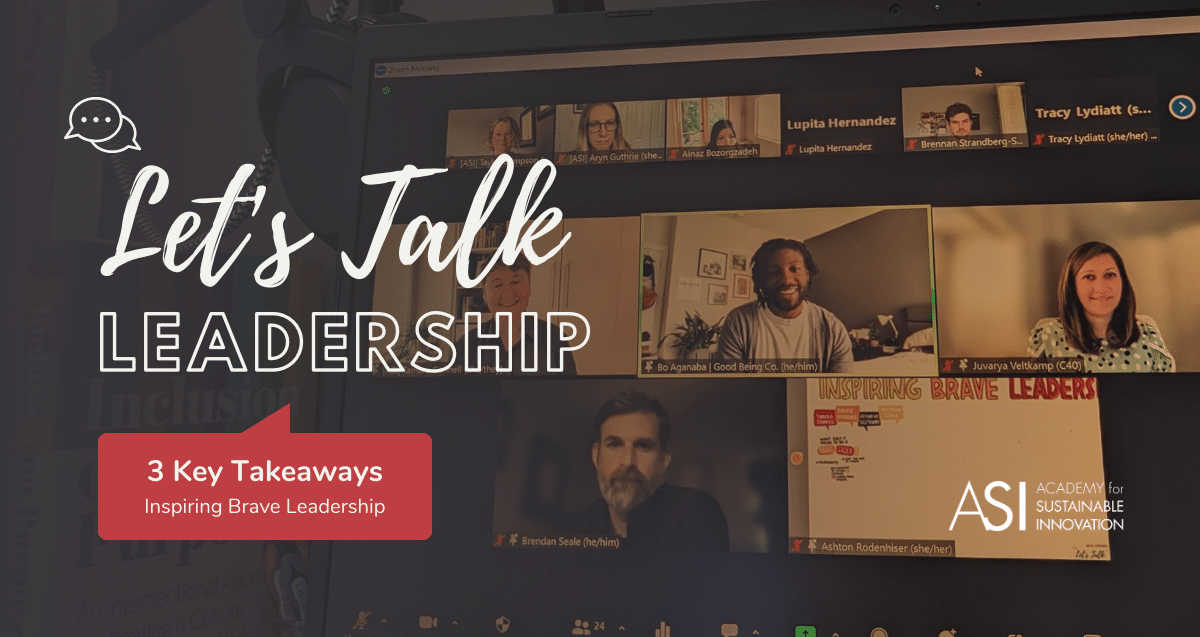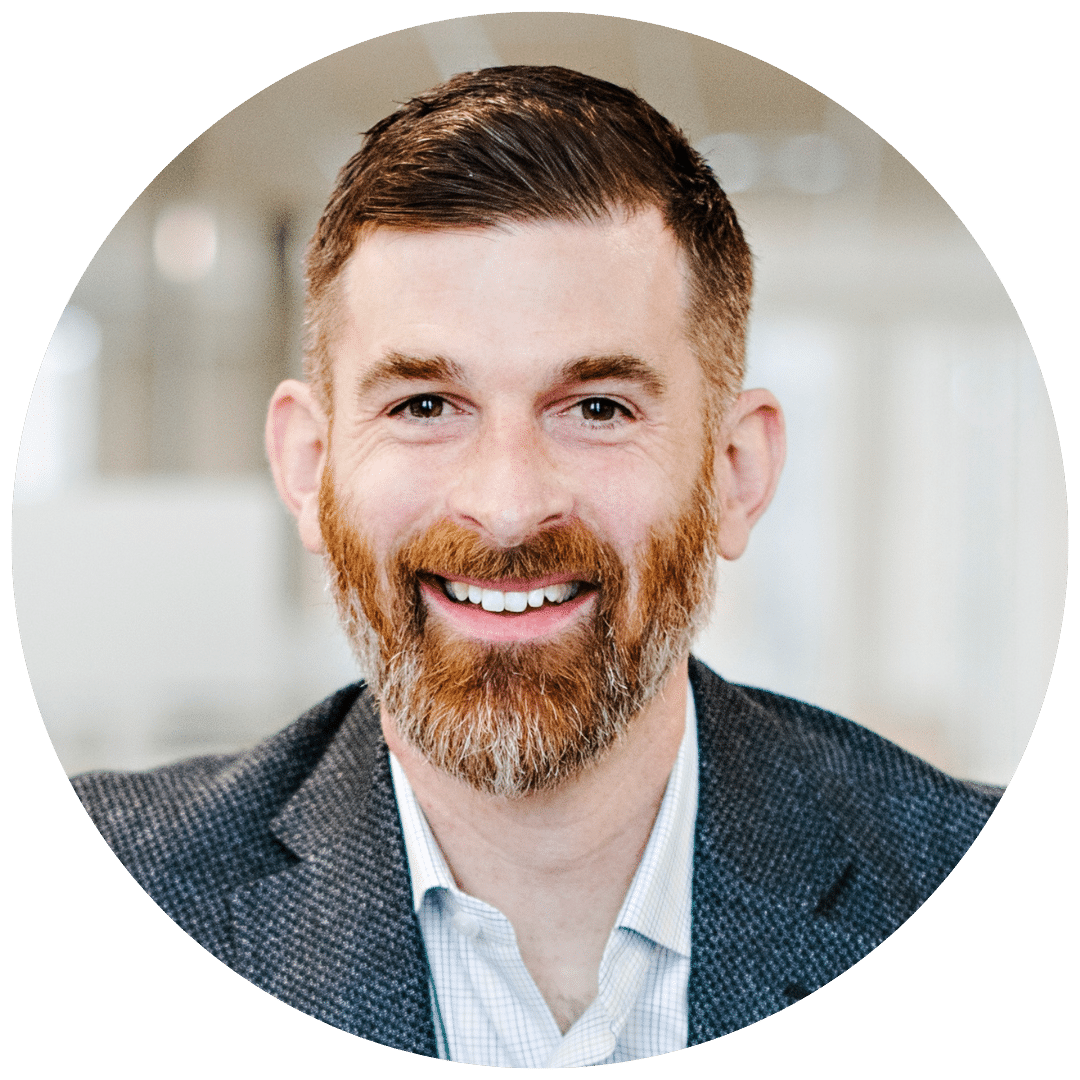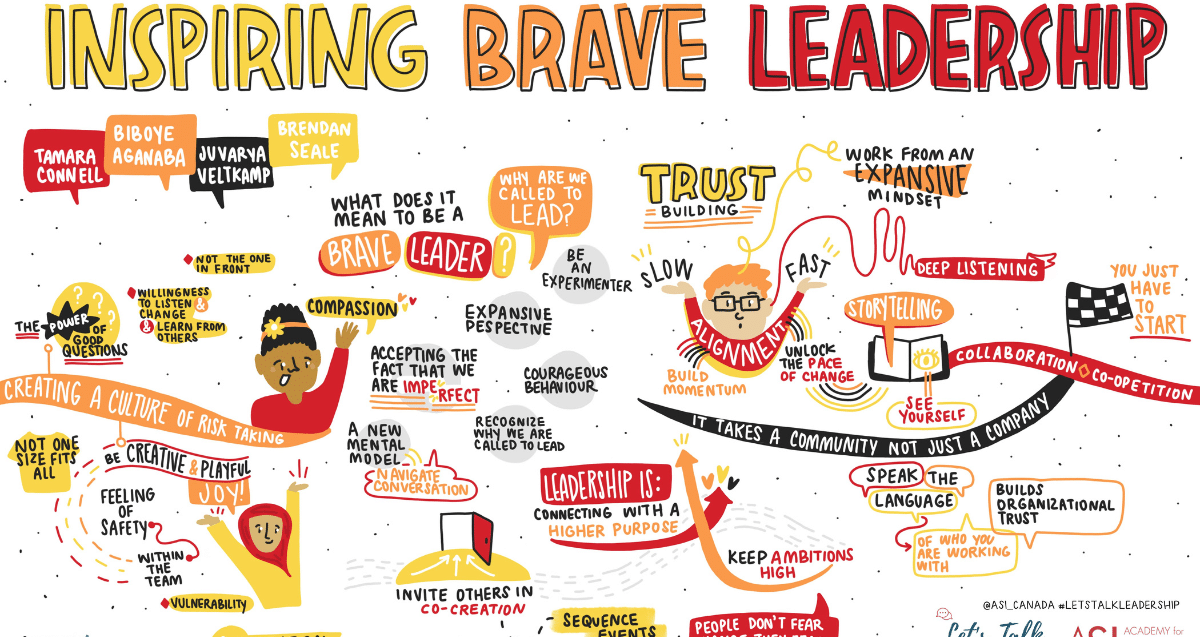- Audio Graphic Recording
by Let’s Talk Leadership: Designing a Gender-Inclusive & Climate-Positive Future
In the face of mounting global challenges, the role of leadership in stewarding meaningful climate action has become more crucial than ever. Climate change presents a complex web of interconnected problems that need bold and courageous leadership to navigate the uncertainties ahead. Brave leaders rise to the occasion to inspire change and what we learned from our second Let’s Talk Leadership event is that any person has the ability to inspire change within their sphere of influence – no matter your job title, the industry you are in, or your experience in a sustainability role.
If you missed attending, we wanted to reiterate that the Let’s Talk Leadership events are not recorded to encourage open and honest conversations. In lieu of a recording, we had a graphic recorder put together an illustration capturing some of our collective thoughts. By exploring the relationship between brave leadership and taking collective climate action, we were able to uncover the powerful potential of courageous leaders to drive systemic change, redefine norms, and to understand how we can forge a path toward a low-carbon, socially-inclusive future.

So how can you inspire brave leadership within your sphere of influence? We’ve compiled a couple key of takeaways from the event:
Embracing vulnerability
The role of vulnerability in leadership isn’t talked about enough despite being one of the most important drivers of change. While vulnerability may seem counterintuitive to traditional notions of leadership strength, Biboye Aganaba pointed out that displaying vulnerability can actually foster trust, authenticity, and create stronger connections with your team.
Examples of displaying vulnerability included:
- Be open, honest, and willing to show your true self, including acknowledging your limitations, asking for help, and admitting mistakes. Be sure to share your personal motivations related to the work and its impact.
- Develop self-awareness by actively seeking feedback from others and reflecting on your own actions and behaviors.
- Engage in active listening when interacting with your team members. Show genuine interest, provide your full attention, and create a space for them to express themselves openly.
Building a culture of risk-takers
Building a culture around risk-taking is crucial for promoting sustainability and driving effective climate action. Risk-taking can encourage innovation, foster creativity, and empower individuals and organizations to take bold steps forward. But building a culture around risk-taking is easier said than done and requires intentional and thoughtful action from leaders. As Juvarya Veltkamp said, it can be slow to create alignment, to gain buy-in, and to build the culture you want but the momentum will be sustained for the long-term if you do.
Examples of how to build a culture of risk-takers included:
- Encourage collaboration: Collaboration brings together people with different backgrounds, experiences, and expertise. When individuals from various disciplines and areas of knowledge collaborate, they bring unique perspectives to problem-solving and decision-making processes. This diversity of thought enables innovative ideas and solutions to emerge, encouraging risk-taking behavior.
- Learn from failure: Make sure employees know that it’s okay to fail. Encourage individuals to see setbacks as opportunities for improvement and learning. Recognize and reward those who take calculated risks, even if the outcomes are not always successful.
- Promote a growth mindset: All three speakers agreed that asking good questions can often be more valuable than receiving good answers. Good questions can spark curiosity, encourage deep thinking, and prompt individuals to analyze sustainability issues from various angles. In contrast, good answers may provide immediate information but may not necessarily foster big-picture thinking or build problem-solving muscles on the team.
Involve your employees (or other key stakeholders)
When talking about building a culture around risk-taking, the topic of overcoming fear as it relates to organizational change was brought up. Brendan Seale emphasized that people don’t necessarily fear change, but they may fear being changed. Meaning that change can cause people to lose their sense of control, and the unknown outcomes that change brings can be intimidating. Leaders must recognize that people’s reactions to change are not necessarily a reflection of their aversion to innovation or progress.
Ideas for how you can involve your employees included:
- Invite perspectives from across the organization and involve employees in the change process. Include all levels and role types, as well as individuals from different departments or groups. By seeking their input, involving them in decision-making, and providing opportunities for collaboration, individuals will feel empowered and will generate a sense of ownership which can help mitigate the fear of being changed.
- Incorporate elements of playfulness and creativity when possible. When individuals are able to achieve a state of flow by balancing their skills with the level of challenge and feeling secure, their creativity skyrockets!
- Keep the ambition high, and invite a sense of collective momentum towards exciting new futures.
About the Speakers

Biboye (Bo) Aganaba (he/him)
Founder/Principal, Good Being Co.
Biboye (Bo) is the Founder and Principal of Good Being Co., and was most recently the Executive Director of Leading Change, where he was responsible for the operations, fundraising, and strategic planning of the organization. As the son of Nigerian immigrants and also having lived in multiple countries, Bo is a self-described global citizen. He is passionate about the relationships between urbanism, ecology, social justice, and how we can embrace the wisdom of the natural world within the places that we live. With Leading Change, Bo worked to empower youth sustainability leadership across Canada. He sees this next decade as a critical opportunity to introduce a new set of values and norms into the workplace in order to help Canada reach its climate goals in a sustainable, equitable, and socially-just manner.

Juvarya Veltkamp (she/her)
Senior Advisor, Green Ports Forum, C40 Cities
Juvarya is Senior Advisor for the Green Ports Forum, where she is responsible for convening cities, port authorities, and other actors to reduce port and supply chain-related emissions and promote positive health and economic resilience across these sectors. She has extensive experience working at the intersection of green buildings, cleantech, climate risk and governance, sustainable finance, and economic development.
From 2010-2020, Juvarya was a key contributor to Vancouver’s Greenest City Action Plan, championing Green Economy Initiatives in her role with the Vancouver Economic Commission. She was responsible for shaping action research, initiating pilot projects, facilitating peer-to-peer learning, conceptualizing economic models, and orchestrating multi-stakeholder collaborations. She has also held leadership positions at the Canada Climate Law Initiative and with a public sector impact investing fund, InBC Investment.
Juvarya is passionate about bringing people together to shift perspectives and orchestrate change, and she earned an MBA from the University of British Columbia as well as a BA in Economics and Sustainable Development from the School of Oriental and African Studies in London. Originally from the UK with Pakistani heritage, Juvarya grew up in Saudi Arabia and now lives with her husband and two young children in a mountain town called Squamish in British Columbia, Canada.

Brendan Seale (he/him)
AVP & Head, Environmental, Social & Governance (ESG), Definity Financial
Brendan Seale is AVP & Head of Environment, Social & Governance (ESG) at Definity Financial Corporation, the parent company of the Sonnet, Economical, Family, and Petline insurance brands. His team is responsible for Definity’s enterprise sustainability strategy in support of the company’s purpose – building a better world by helping clients and communities adapt and thrive.
Previously Brendan has served in sustainability leadership roles with Scotiabank, IKEA, and The Natural Step Canada. He holds an MSc in Strategic Leadership towards Sustainability and a BA in Communications.
He lives with his partner and their two sons in Kitchener, Ontario, the traditional territory of, and lands that were promised to the Six Nations of the Grand River through the Haldimand Treaty.
Brendan’s feet like to keep the company of bicycle pedals, soccer cleats, alpine ski boots, and infectious beats.


